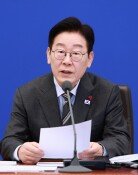If Newspaper Reform Comes First, Why Exclude the Broadcasting Sector?
If Newspaper Reform Comes First, Why Exclude the Broadcasting Sector?
Posted August. 31, 2004 21:58,
The Grand National Partys position that newspaper reform and reform in the broadcasting sector should go side by side was presented by Nam Kyung-pil, the deputy floor leader of the Grand National Party, who refuted the move for the ruling partys media reform policies point by point based on the premise that it is only a virtual view of a party in the national debate for media reform legislation, which was held yesterday morning at the General Assembly Hall.
On the matter of newspaper-conglomerate holdings, which are provoking the biggest controversy, he opposed, saying, There is a possibility that it is a breach of the constitution. Also, regarding the move that bars the top three newspaper conglomerates from holding more than 65 to 70 percent (20 to 25 percent for a single operation) of the entire newspaper market share, he refuted this by saying, The matter of the possession rate for newspapers, broadcasting, and the internet should be discussed. He brought forth the idea of developing an index for the influencing power of the media that applies to all media as an alternative.
Also, he also announced that there needs to be about two to three years of long-term research done for the Korea Press Development Committee, the immediate interest of the assembly speaker, in order to establish political impartiality in the press.
Senior Deputy Floor Leader Nam said, Although the Uri Party mainly discusses only media reform, the problems faced by the media and broadcasting industry should be solved together, side by side, and suggested that he would focus on reform in the broadcasting sector such as abolishing the subscription fees for the Korea Broadcasting System (KBS) in the regular assembly session.
There also was much opposition to the disciplinary compensation system that the Uri Party decided to introduce. This compensation system is a system that imposes much more compensation than the amount of compensation media report victims can claim in court.
Regarding the matters of media reform and the introduction of the disciplinary compensation system, the Grand National Party and the Democratic Labor Party shared similar views. Cheon Young-se, the floor leader of the Democratic Labor Party also said, Newspaper reform should go side-by-side with the reform of the broadcasting sector, and the disciplinary compensation system may reduce the activity of the press.
The Uri Party: Newspaper reform is the priority
Lawmakers from the Uri Party, such as Kim Jae-hong and Yoo Shi-min, refuted the Grand National Partys logic by emphasizing the necessity of newspaper reform. However, they revealed some dissent on some parts, and referred to the complicated situation surrounding media reform legislation within the ruling party.
Lawmaker Yoo, who announced the restriction on holdings and the policy of barring media owners from owning a dominant share of newspapers through a press interview the day before, also held a press interview after this days debate and suggested the establishment of a Diverse Media Committee as a private or a government organization in order to discuss matters such as the prevention of media monopolies or oligopolies as well as the maintenance of a joint delivery system.
On the restriction on holdings of newspaper owners, he insisted, It is based on a constitution which clearly states the exercise of property rights should be appropriate for the social welfare.
However, lawmaker Yoo questioned the effectiveness of that, saying, Neither putting restrictions on holdings nor establishing an editing committee will be of any use.
Lawmaker Yoo stated a different view on media reform, saying, There is a problem with KBS, and suggested, KBS should divide itself into KBS One and KBS Two in accordance with the competition for ratings.
Seung-Heon Lee ddr@donga.com





![“한동훈, 정치생명 걸고 무소속 출마해 평가받는 것 고려할만”[정치를 부탁해]](https://dimg.donga.com/c/138/175/90/1/wps/NEWS/IMAGE/2026/01/19/133186982.1.jpg)

